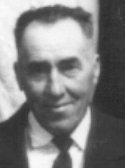 Raymond Hugh Kimber arrived on February 25, in 1902. The proud parents were Charles and Persis Josephine Laird Kimber. At the time, they were living in a dirt-roofed, log house that was situated just south of where the big house was later built. Charles and Josie’s family grew by leaps and bounds, so Charles built a new two-story frame house. Dad could remember moving into it. He was probably about nine years old.
Raymond Hugh Kimber arrived on February 25, in 1902. The proud parents were Charles and Persis Josephine Laird Kimber. At the time, they were living in a dirt-roofed, log house that was situated just south of where the big house was later built. Charles and Josie’s family grew by leaps and bounds, so Charles built a new two-story frame house. Dad could remember moving into it. He was probably about nine years old.
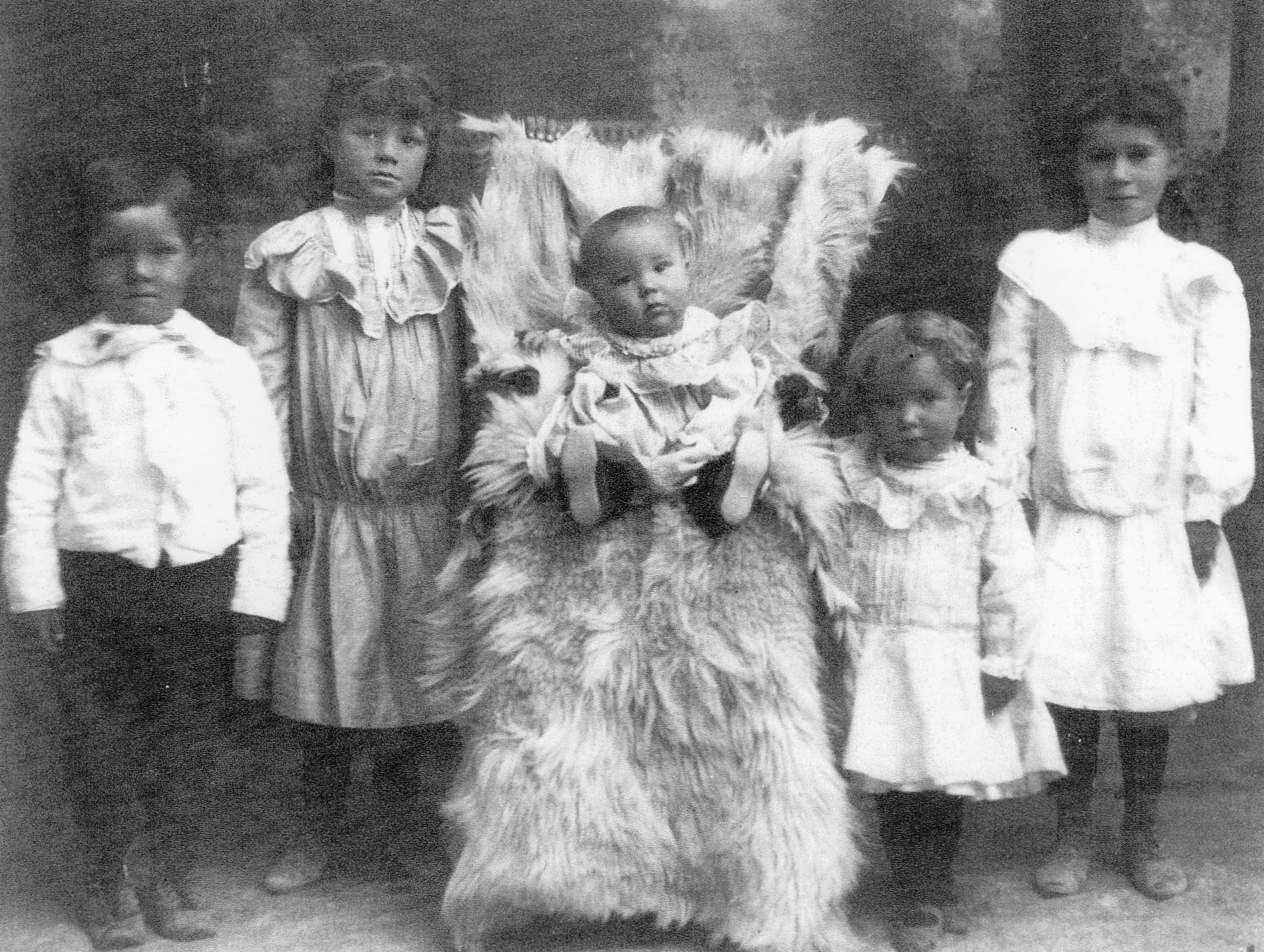
Winfred, Mary, Ray, Florence, & Chloe Kimber, ca.1903
I asked him what he did as a boy for fun and he said when they could, a group of them would go swimming over in Mide’s pond. Of course, this was during the summer. He loved to hunt rabbits and other small animals with the .22 rifle he had. In the winter they would tie their sleds behind any horse-pulled sleigh that came along. They would go as far as they could or would and then wait for another sleigh going back and tie onto it. Dad remembered how cold he would get, but that didn’t stop them. He also learned how to ice skate down at the creek. This helped him to know how to roller skate after his father had the dance hall built. The hall stood just north of Aunt Lou’s home.
It doesn’t sound as if they were short of animals around his house while he was growing up – dogs, cats, geese, pigs and, of course, milk cows and their calves. Dad wasn’t too old before his father saw to it that they had a horse to ride.
As for school, he started that in 1908. His first teacher was Marion Halstead and they called it the beginning grade. In the middle of his school years, they moved his class to the old church house. I guess they needed more room. Later, after the two front rooms were built, they moved back. He started but never got to finish the eighth grade. He stopped so he could go to work. From the records that I have, he must have returned during the winter months during the next two years but always left before school dismissed for the summer because the records say that he was discontinued on April 18, 1920. This would put his age at eighteen. .
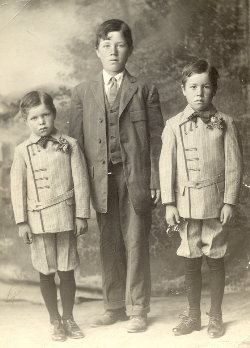
Edwin, Winfred & Raymond Kimber
At age sixteen, he started freighting with his Grandfather and Dad. They would freight for the UC (Utah Construction). He began with driving two horses but soon he was working four. They would haul wool down and quite often coal back, but not always.
The winter of 1921 was a hard one. Dad worked as a sheepherder during it and in 1922. This was the year (1921) that he bought his first cow and calf, paying $45.00 for the pair. In 1924 his dad gave him a horse. I don’t know how long he had it but when he sold it, it brought him three heifer yearlings.
In the fall of 1932 Dad worked for the Box Elder County Road Department, hauling gravel. Their boss was Newell Udy. There were quite a bunch of them. Oren Kimber, Ernest and Grant Kimber, Joe Kimber, George Paskett, Ray Roberts, George (Kid) Blanthorn and Dad each had an outfit of two wagons and four horses. Bill Frost, Ted Hadfield and Sam Simpson had one team and wagon. Those with two wagons would hitch them together and pull them with both teams. Uncle Winfred would grade the gravel with his team and grader. Because it was so cold they would jump off of their wagons, gather some brush and start it on fire on top of the gravel they were hauling. This would work only one way as they would be empty on the return trip. They camped at Al Springs and while at this job George Blanthorn and Ray Tanner brought some of their cows down and about seventy-five of them died of eating too much grease-wood. Dad and some of the others started helping to skin the animals but only for part of the day because they needed to get back to hauling gravel. Dad had to sleep in a tent. The sheep camp was down there but Oren and Winfred were in it first. Dad started the job later than they. That winter the snow got very deep.
Soon it was spring and Dad got another job with the UC (Utah Construction) sheep herding just north of Wells, Nevada at a place called Bishop’s Flat. He was working there when Midas Wakefield and May Kimber came to get him because his dad was sick. On May 11, 1933, his father died. For the next eight or nine years, Dad mostly stayed with his mom, working the ranch, although he would leave to do jobs off and on. Uncle Ted and Dad leased the home place from their mother.
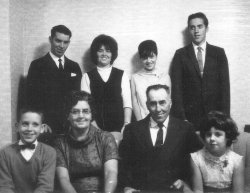
Ray Kimber Family – Back Row: Ray Jr., Judy, Sharon, David. Front Row: Elden, Wilda, Ray, Betty
In the spring of 1924, Dad worked again for the UC. This time was to stomp the wool into bags. The bags were about ten feet long. Someone would toss five fleeces into the bag and Dad would stomp. This would go on until Dad was standing on top of the bag. You could say that he had to work his way to the top. The bags would hold forty to forty-five fleeces. Each spring they would shear approximately 25,000 sheep. It would take them thirty days to complete the job. Some of the shearers were Archie Toyn, Elmer, Oz, Ted, Winfred, Grant, Ivan and Ernest Kimber, Wellie Richins, Arland, Mide and Jack Wakefield and Roy Frost. On days that it rained, there would be no shearing. Dad was the only stomper. He got paid $6.00 a day whether he worked or not because of rain. The others got paid by the head. Lawrence Kimber and Alfred Toyn were the wranglers. Don Wakefield tied the sacks. They sheared at Mill Creek (by Max Tanner’s), at Lumus Creek (by the HD and it’s west of Max’s), at Dead Man (along the railroad track), at Brown’s Bench and at Hot Creek which is by Dad Elquist’s ranch. From Mill Creek to Hot Creek, Dad rode on top of a truck to make sure no equipment fell off. They got to visit Montello and Wells. They all had meal passes from the UC. Dad worked for five years during the spring months stomping wool for the UC and different people. One time someone threatened to toss a water snake into the bag with him but thought better of it when Dad had someone else toss a rock up to him. Whether Dad meant the rock for the snake or for the prankster will never be known. In my opinion, I would have been very nervous if I had been the prankster.
The year of 1934 was a bad one for putting up hay. There had been no snow the previous winter nor rain during the summer. It was definitely a drought year. To keep going they would sell a horse every two weeks. Small horses would bring $20.00. Cows were bringing about the same but if they sold lower than the $20.00, the government let the rancher butcher it for themselves and still get the money it would have brought. That winter Dad took the company cows to the Land Ranch north of Oakley, Idaho. He also took the sheep camp to stay in and a haywagon with panels on for the baby calves that got tired. He stayed on Elquist’s land and bought Saul Clark’s hay to feed them. They got a drought relief loan with which to buy the hay.
There was another year in which very little hay was raised in Grouse Creek so it was decided that Dad would spend the winter in Yost, feeding the cows. It was easier at that time to take the cows to the hay than the hay to the cows. They left as many cows as they had hay for and Oren fed them. New Year’s Day was spent at Grouse Creek at home listening to the radio broadcasting from New York City. Dad had taken the sheep wagon up to Poison Creek about two days before. No snow yet. It started to snow New Year’s Day. That day Dad, Oren, Winfred, plus Byron and Ray Roberts, drove some of Dad’s, some of Ted’s, some company cows, and maybe some of Oren’s cows to Junction. Ted was working for Ralph Tanner at Clear Creek doing the same thing Dad was. Winfred took a sleigh loaded with hay before them to break a trail. He only went to the top of the mountain. Dad used four horses to pull the sheep camp on up the mountain. They camped at Philbert Lind’s that night. Byron and Ray Roberts stayed in Lynn that winter to run the mail from there to Oakley. Dad drove the sheep camp while Oren drove the cattle, with the help of a good dog. They had bought some hay from Hazel Yates so Dad camped at a spring about a quarter of a mile below Hazel and LaRue Yates’s home. It is the brick house below Spencer’s. Oren returned to Grouse Creek. Dad spent many a night playing Monopoly at Hazel and LaRue’s with them and the three school teachers that was boarding with them that winter. Dad had at Yost that winter four work horses and two or three riding horses. When spring came Oren rode over to help Dad drive the cattle home. Coming over the mountain they ran into a blizzard. When they got down out of it they realized that some of the cows were missing. Back they went. The blizzard had quit enough so that they could see the lost cows and they drove them down to the main bunch and on down to home.
Dad signed up in the fall of 1941 for the Army and next spring while he was sheep herding, they called him for induction but he didn’t enter the Army until October 5, 1942. Just prior to this he got busy and had a courtship with my mother. On one of their dates, Dad took Mom to Burley for dinner and a movie. During their short engagement, he went and got Mom from Montello where she was working and brought her back to Grouse Creek so that she could get all her things packed. Then they went to Brigham City to inform Dad’s mom, Josie, of the upcoming marriage. The next stop was at Salt Lake City where they bought Mom her rings. From there they went to Elko, Nevada and got married. Their honeymoon was a trip to Twin Falls and Burley. Three days after, on October 5, Dad went into the Army. Early that morning Dad left Mom in Brigham City and caught a train to Salt Lake City. The Army trucked the new recruits to the induction center and then to Fort Douglas for a week. Then they rode the train to Dewiter, Louisiana, with stops at Denver, Colorado, and Amarillo, Texas. He spent the next six months there. Dad earned $20.00 per month and they also paid Mom $50.00 while he was in the Army. Until Dad sent for Mom to join him, she worked at the Cooley Hospital in Brigham City. Dad would get weekend passes and they would go sightseeing. At one time, Dad wanted to check out a bull a little closer but the bull wasn’t agreeable so Dad stayed on his side of the fence. Wise choice!
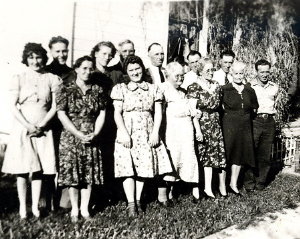
Fern, Charles, Chloe, Vera, Elmer, Elsie, Winfred, Josie, Ted, Louie, Ray, Nell, and Oren Kimber
Dad was able to get an honorable discharge from the Army because of his age (forty-one) and the fact that he owned and operated a cattle ranch. When he got discharged, Dad could hardly believe it. They were going HOME!! They rode the bus all the way to Brigham City with only one overnight stop at Kansas City. Dad wanted to see the stockyards.
Dad and Mom rented a little house just south of the Blanthorn place -the Ted Hadfield home. They lived there for a few years and then the Charles Ballingham ranch was put up for sale. This ranch was located about four miles south of the church house and had a large two-story house on it. With the help of his brothers, Ted, Winfred and Oren, Dad was able to purchase this land. Dad paid off Oren within a year and the following year, Dad traded cattle with Ted for his share. It took a little longer to pay Winfred back. Winfred was needing the hay that was being harvested off of the place to feed his cows so he really didn’t want to be bought out at that time.
Judy and Ray Jr. were born while they were living in the little house up by Blanthorn’s. Over the course of the next fifteen years David, Sharon, Elden and Betty joined their small family, making it a family of eight.
Dad grew up hunting. When he was younger, he and his brothers would hunt for rabbits and other small game. As he got older, hunting was just as important. One time Dad, Parley Paskett, Pop Elquist, Saul Clark, George Blanthorn and another man went hunting rabbits using willow sticks and got around a hundred that night. Also, every year there would be the annual deer hunt with his brothers and friends. In 1945, he killed a mountain lion. One year soon after he was married, Dad went hunting coyotes with Oren. Racing after the coyote, Dad and his horse ran into a wash and took quite a tumble. After they got straightened back out, it took them another hour to catch up to the coyote again. When Dad got back home, his ankle was so swollen that he could hardly walk.
They finally ended up taking him to Logan to see the doc, much against his will. It wasn’t broken but he had to stay off it for about a week.
Dad developed quite a skill at roping. In his lifetime, at different times, he has roped three deer and they’re not easy to catch. One deer was a full-grown buck and Dad was alone. This caused quite a dilemma. How was Dad to get his rope off without getting hurt? When the deer finally choked down, he was able to release him and still get out of harm’s way.
Progress was marching on. Tractors started replacing work horses but for working cattle there was nothing like a good cow horse. Dad had his favorites, of course. Two that I remember were named Sorrel Top and Cindy. Sorrel Top was out of mustang stock and always (and I mean always) tried to buck Dad off when getting on her first thing in the morning. Cindy was actually a very good horse but she had a bad habit of taking off in a dead run whenever Dad removed his hat (which he did sometimes to see if she was paying attention and she was each and every time).
In 1960, they bought the Mervin and Lorna Kimber Tanner place. This ranch is about four miles north of the church house and had a much better home and outbuildings located on it. A field that we call the Homestead was purchased with it. It was two miles further up the valley and only had an old corral on it plus two sections in Cook’s Canyon.
At this time, Dad was working for the BLM. He had to take an outside job to keep the ranch as a major drought was in progress. This was a rough time to be a rancher in Grouse Creek. Dad started as a firefighter and fencer and moved up to a heavy equipment operator by the time he retired.
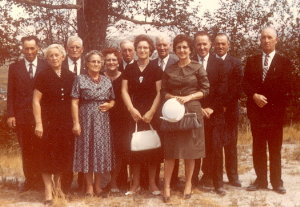
Raymond, Louisa Roberts, Elmer, Chloe Tanner, Elsie Smith, Rollo James (Jim), Vera Tanner, Osborne (OZ), Fern Shaw, Charles Junior, Edwin (Ted) and Winfred
In 1966, Dawna Rae joined our family. She is Mom and Dad’s first grandchild. As soon as she could, she became Dad’s shadow. She went with us when we did the chores and she especially enjoyed going with us when we were moving cattle.
For several years, Dad and his “crew” made and baked sour dough biscuits for everyone that attended the annual Soil Conservation Day. Dad would cook these biscuits in dutch ovens and was gaining quite a reputation concerning them.
Concerning church jobs, Dad served as an assistant in the YMMIA and also as president in the same organization. The calling I remember most was the one he had over the church farm and cows. We spent many hours working and feeding that herd. They were almost like our own herd except that when it became time to brand the new calves we had quite a crew to help.
Dad served his community in many ways but the way I remember most was his job as water master. He would walk many miles fulfilling his responsibilities as such.
In November 1977 Dad caught what we thought was the flu but it just kept hanging on. In January, Dad finally consented to go to the doctor. One of the problems that he discovered was that Dad only had about one fourth of his blood. At first they thought that it was the disease that one gets from drinking raw milk but Dad was soon diagnosed as having cancer. What a dreaded word. They started treatments in February and he finished them up on March 30 and come home. It looked like a clean slate for him but he was very weak and the doctors did not think that he would be able to gain muscle back again. Wrong. With Dad’s will and determination and Mom doctoring and feeding him, he was able to throw away his walker and start irrigating again.
From my journal: “March 31, 1980. No matter how I phrase it, it’s going to sound rough–so here goes. My Dad has cancer, again. The first time was two years ago. His doctors gave him two months. Well, we had a miracle happen and he was pronounced clean but now it’s in his bones. Somehow this time I just don’t feel like he’s going to make it. He always has been so healthy it’s hard to realize that he’s as sick as he is and that there’s a lot of little monster cells taking over inside of him.”
After a valiant battle, Dad died on August 4, 1980 at his home in Grouse Creek. The viewing and funeral was held on August 6th and was attended by many family members and friends. It was a very large funeral. He was buried in the Grouse Creek Cemetery.
I would like to end this history with a part of the talk given by Mervin Tanner at Dad’s funeral: “Ray has left his mark upon the land, the fences that were built with the blood and sweat, especially over and across these east mountains, built with a jackhammer, drilling into the solid rock, driving metal posts into the holes, stringing the wire by hand, building the roads ahead, leaving the fence behind, are monuments to him that will endure for a long time. He had left his mark upon the trails and the canyons and over the mountain passes, where time after time he has ridden his horse in sunshine and in snow and in the rain and in the light of day and also in the darkness of the night, sometimes driving a herd of cattle ahead of him. He left his mark in the community in many ways, in the water systems, in the cattle association, in his daily dealings with his fellow man and particularly has he left his mark in his family, of whom he was very proud.”
Dad touched the lives of so many people and I have never heard anybody say one negative thing about my Dad. What a legacy!
Written by his daughter, Sharon Kae Kimber
July 1996
